A Study of Oliver Twist’s Major Themes and Symbols
英国文学olivertwist故事梗概

Leader thief Train Oliver as a pickpocket
A man who Oliver’s thief friends rob on the street .
takes Oliver in and take care of Oliver
2023/9/14
8
In London
Mr Brownlow
2023/9/14
6
Plot Overview
Poor farm( Oliver’s early 9 years)
Workhouse( pick oakum麻絮)
Coffin maker’s
London
2023/9/14
7
Fagin
In London
Mr brownlow
Fagin
him from investigation.
2023/9/14
9
Climax
Mr Brownlow Mrs Maylie
Reveal the plot
MonksHappFra bibliotek lifeOliver
Half brother
accomplice
Fagin
Tell the secret
Nancy
Overheard the talk
Twist to help them rob.
2023/9/14
5
Mr Brownlow: a kind man helped Oliver Twist. He is a best friend of Oliver Twist’s father ,too.
Nancy was killed by Bill since she helped Oliver
oliver twist
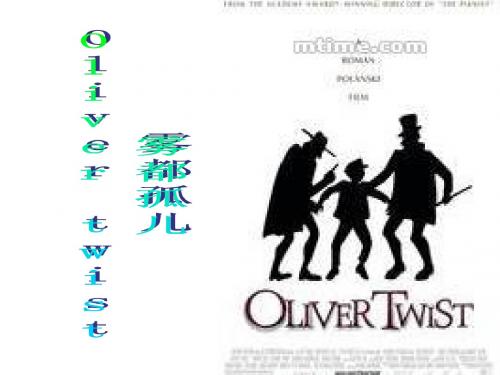
The Story
Once Oliver is forced to help a burglar, Bill Sikes.Because of it, Oliver is shot and badly wounded, the kindly care fr om Mrs Maylie and her beautiful ado pted niece Rose brings him back to hea lth, Nancy, who now repents for wha t she has done, tries to help .
The Story
Monks is the half brother of Oliver a nd he does all this for the purpose of s eizing the whole of their father’s prop erty. Rose is revealed in the end to be the sister of Oliver’s dead mother. Oli ver is finally adopted by Mr Brownlo w. Monks is exiled and dies in tells Rose and Mr. Brownlow of the mystery about Oliver’s origin and is found out by the gang and brutally murdered by Bill Sikes. Persued by hi s guilty conscience he hangs himself while trying to escape. Fagin is arrest ed and executed .
A review of Oliver Twist
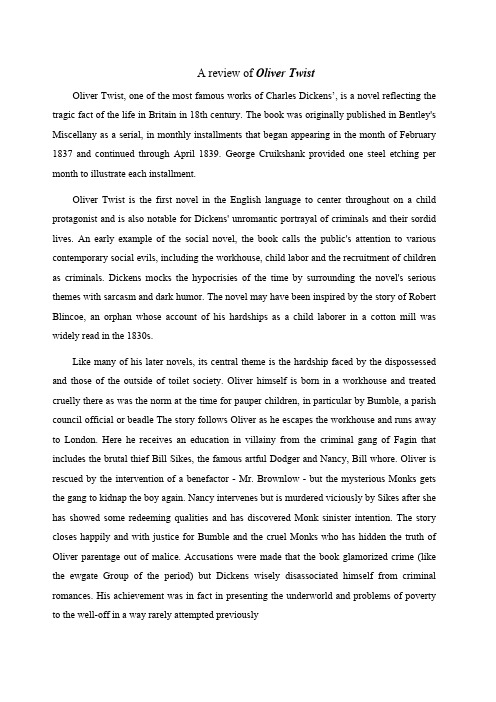
A review of Oliver TwistOliver Twist, one of the most famous works of Charles Dickens’, is a novel reflecting the tragic fact of the life in Britain in 18th century. The book was originally published in Bentley's Miscellany as a serial, in monthly installments that began appearing in the month of February 1837 and continued through April 1839. George Cruikshank provided one steel etching per month to illustrate each installment.Oliver Twist is the first novel in the English language to center throughout on a child protagonist and is also notable for Dickens' unromantic portrayal of criminals and their sordid lives. An early example of the social novel, the book calls the public's attention to various contemporary social evils, including the workhouse, child labor and the recruitment of children as criminals. Dickens mocks the hypocrisies of the time by surrounding the novel's serious themes with sarcasm and dark humor. The novel may have been inspired by the story of Robert Blincoe, an orphan whose account of his hardships as a child laborer in a cotton mill was widely read in the 1830s.Like many of his later novels, its central theme is the hardship faced by the dispossessed and those of the outside of toilet society. Oliver himself is born in a workhouse and treated cruelly there as was the norm at the time for pauper children, in particular by Bumble, a parish council official or beadle The story follows Oliver as he escapes the workhouse and runs away to London. Here he receives an education in villainy from the criminal gang of Fagin that includes the brutal thief Bill Sikes, the famous artful Dodger and Nancy, Bill whore. Oliver is rescued by the intervention of a benefactor - Mr. Brownlow - but the mysterious Monks gets the gang to kidnap the boy again. Nancy intervenes but is murdered viciously by Sikes after she has showed some redeeming qualities and has discovered Monk sinister intention. The story closes happily and with justice for Bumble and the cruel Monks who has hidden the truth of Oliver parentage out of malice. Accusations were made that the book glamorized crime (like the ewgate Group of the period) but Dickens wisely disassociated himself from criminal romances. His achievement was in fact in presenting the underworld and problems of poverty to the well-off in a way rarely attempted previouslyThe hero of Oliver Twist, a poor, innocent orphan boy, stands out in this story as the main character but it is the supporting characters that allow this novel of much content to develop a much more satisfying and believable theme. With "Good V.S. Evil" as one of the major conflicts, in such categories are the secondary characters found as well. Three main auxiliary characters of Oliver Twist aid the elaboration of the story; these significant characters are Mr. Brownlow representing purity, integrity and goodness, Nancy as partially righteous, partially villain and lastly on the other extreme of the scale: Fagin, the symbol of evil, corruption and manipulation. Throughout the story we are introduced to each of these characters through an omniscient point of view, and are able to categorize them according to their personalities, thoughts and actions. With their differing levels of honesty and social status, each of them play a crucial role in the development of the story's theme.As most of the author's characters, Mr. Brownlow too, is brought out with an indirect presentation but it is not long after introducing him that his wholesome goodness is revealed to us. Though at first he accuses Oliver of thieving, his concern over Oliver's welfare on the street is a direct hint of his innocence which successfully helps him convince Oliver to board at his house. A generous and trusting man he was, perhaps too good a man to be true; but with all the malicious characters in the story, a heroic and pure persona was needed to ensure a happy ending. With honesty and great wealth as his prime qualities, he assists Oliver in his times of need and demonstrates to society with an exemplary touch, the attributes of a perfect citizen. As the positive extreme in both social status and benevolence, Mr. Brownlow is a definite aid in the development of the theme throughout the novel. Nancy, for us, must be the weakest character. Trapped between wanting to help Oliver evade Fagin's exploitation and her dedicated love for Sikes; she fails to survive to the end as she is convicted and ironically murdered by her own husband : Sikes, a brutal and abusive man. But there is a great need for this secondary character in the story, she serves not only as a tie between the scenes at the different house holds but as well she is the only hope of salvation for Oliver. Without her, Oliver may have never had the chance to grow up in a loving home and learn to be proper in his actions and pure in the soul. Even though her ununderstandable love for Sikes is honest most of the time, her own soul held an even greater devotion to Oliver, for she gets her own husband drunk and comes to Oliver's rescue. Nancy sees in Oliver the innocence of her ownchildhood being robbed by Fagin's deceiving malpractice. Nancy provides the story with a second chance for Oliver into a proper, honest world. It costs her, her life, but she prospers in helping Oliver as well as doing a lot of justice for society. Able to save Oliver from evil and putting evil itself in prison, Nancy triumphs above all her devilish acquaintances and is the pivoting point of Oliver's return to safety. Not only as a way to introduce new plots in the tale, but as well as the theme's greatest support, she is a genial character that could have only been created after much planning and thought.Fagin was a Jew described by the author in such a manner that one may think Dickens were racist to some extent. His beliefs of Jew's were that a Jew seldom thieves, but is worse than a thief when he encourages others to thieve. In his opinion, "In every town there is a Jew, resident or tramping;... if a robbery is effected, the property is hid till a Jew is found, and a bargain is then made." Fagin is described in such a style in this tale that one is almost forced to dislike his character. Old, ugly and a "Jew", Fagin is associated with principal atmospheric devices that give the novel unique power. Not only does Fagin seek to capture Oliver forever by making him an accomplice in crime, but it also seems that he has supernatural powers to seek him out of wherever his good friends may hide him. Truly the antagonist, Fagin and his amoral forces are to Oliver as the devil himself is to a sinless human. Even though highly complex and interpretive in its content, "Oliver Twist", like an escape story, where the bad guy gets what he deserves and the good guy lives happily ever after, its main plot follows this same pattern. Fagin, as he deserves, ends up in prison and goes mentally insane, while Oliver, the innocent young boy, gets a great home and a loving family. But Fagin is not all vile, because after going to jail, where he realizes that all his stolen goods will do him no good now, he gives Oliver back what was once his, his mother Agnes' ring; which in turn unleashes Oliver's ancestry and gives the story a more coherent plot. It is the complex secondary characters of this story that permit it to reach out and touch all the levels of society; these being the rich, the poor and the man in the middle. These same three characters are what grant this story with a theme that captures reality in the midst of England's nineteenth century. As revealed throughout the tale, England's nineteenth century was an epoch of much poverty and great social problems which resulted in a society of two opposing classes: the wealthy and the poor. Within these two classes lay two other opposing forces: the good and the bad. In the same way that good and badexist within all classes in the novel, the same thing can be said about real life. What the theme of this story says about reality is that in today’s society, it doesn't matter whether you are rich or poor, educated or not, most competent human beings possess the ability to judge right from wrong and are therefore free to make whatever choices in their lives they wish to make, provided though, that they can live with the consequences of their decisions. In Oliver's case, even just as a very young boy, he too was able to judge right from wrong and ends up choosing not to steal. As a result of his decision, young Oliver is given a happy home and a promising future. On the other hand, Fagin's judgment is not so proficient and concluding, he remains with nothing but insanity and a solemn life in jail 'till his last day comes about.For me, the nature of goodness is one of the most necessary character for a person. Goodness is to humans what water is to fish. He who is without goodness is an utterly worthless person. On the contrary, as the famous saying goes, ‘The fragrance always stays in the hand that gives the rose’, he who is with goodness undoubtedly is a happy and useful person. People receiving his help are grateful to him and he also gets gratified from what he has done, and thus he can do well to both the people he has helped and himself.To my disappointment, nowadays some people seem to doubt the existence of the goodness in humanity. They look down on people’s honesty and kindness, thinking it foolish of people to be warm-hearted. As a result, they show no sympathy to those who are in trouble and seldom offer to help others. On the other hand, they attach importance to money and benefit. In their opinion, money is the only real object while emotions and morality are nihility. If they cannot get profit from showing their ‘kindness’, they draw back when others are faced with trouble and even hit a man when he is down. They are one of the sorts that I really detest.Francis Bacon said in his essay, ‘Goodness, of all virtues and dignities of the mind, is the greatest, being the character of the Deity, and without it, man is a busy, mischievous, wretched thing, no better than a kind of vermin.’That is to say a person without goodness is destined to lose everything. Therefore, I, a kind person, want to tell those ‘vermin-to-be’ to learn from the kind Oliver and regain the nature of goodness.。
Oliver Twist 雾都孤儿
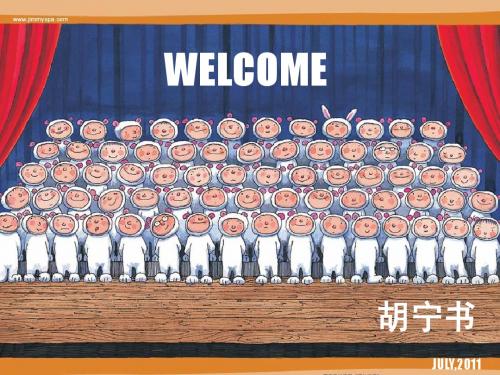
Thoughts after reading
Hunger, cold, lonely Strong, brave and righteous
Compared with Oliver, we lead a happier life, but we still not satisfy, and often complain about life. The target pursuit, but is also encountered little difficulty, they gave up, lack of willpower. At present, there are many children in the world are suffering great pain, hunger, loneliness, the cold war. How much they long for a better life. We can see them? We should cherish the existing conditions to learn, read and study hard so that we are to grow as a social useful person, so that we can have the ability to help these children so that they, like us have the bright sunlight leading a better life.
Full of bad guys
Nancy
Snopysis
Born in a workhouse orphan, starved, bullied
OLIVERTWIST雾都孤儿英文简介
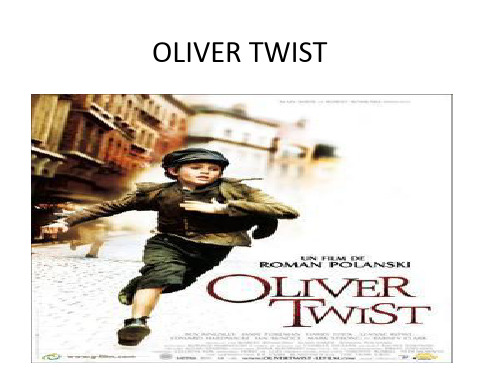
Charles Dickens
(7 February 1812 – 9 June 1870), pen-name "Boz", was the most popular English novelist of the Victorian era and one of the most popular of all time. He created some of literature's most memorable characters. His novels and short stories have never gone out of print. A concern with what he saw as the pressing need for social reform is a theme that runs throughout his work.
• This is a kind man,he gives Oliver enough trust.And with the help of him,Oliver get out of the bad situation and have a good life.
THANKS!
知识回顾 Knowledge Review
• Fagin- The main antagonist in the story, “The Jew” takes Oliver under his wing and tries to make a pickpocket out of him. He is a powerful crime leader who has an affection for only money and will kill anyone who stands in his way.
olivertwist 人物介绍英文
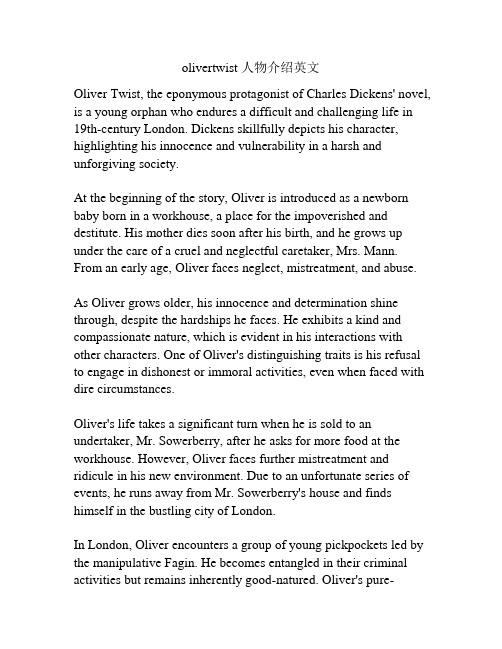
olivertwist 人物介绍英文Oliver Twist, the eponymous protagonist of Charles Dickens' novel, is a young orphan who endures a difficult and challenging life in 19th-century London. Dickens skillfully depicts his character, highlighting his innocence and vulnerability in a harsh and unforgiving society.At the beginning of the story, Oliver is introduced as a newborn baby born in a workhouse, a place for the impoverished and destitute. His mother dies soon after his birth, and he grows up under the care of a cruel and neglectful caretaker, Mrs. Mann. From an early age, Oliver faces neglect, mistreatment, and abuse.As Oliver grows older, his innocence and determination shine through, despite the hardships he faces. He exhibits a kind and compassionate nature, which is evident in his interactions with other characters. One of Oliver's distinguishing traits is his refusal to engage in dishonest or immoral activities, even when faced with dire circumstances.Oliver's life takes a significant turn when he is sold to an undertaker, Mr. Sowerberry, after he asks for more food at the workhouse. However, Oliver faces further mistreatment and ridicule in his new environment. Due to an unfortunate series of events, he runs away from Mr. Sowerberry's house and finds himself in the bustling city of London.In London, Oliver encounters a group of young pickpockets led by the manipulative Fagin. He becomes entangled in their criminal activities but remains inherently good-natured. Oliver's pure-heartedness and empathetic nature stand in stark contrast to the morally corrupt world he finds himself in.The character of Oliver Twist is not only a symbol of innocence and virtue but also serves as a vehicle for Dickens to expose the poverty, social inequality, and corruption prevalent in Victorian society. Through Oliver's eyes, Dickens portrays the struggles and injustices faced by the lower classes, shedding light on the mistreatment of orphans and the exploitation of children.Throughout the novel, Oliver encounters various characters who shape his journey and contribute to his growth. One such character is Nancy, a young woman forced into a life of prostitution by Fagin. Nancy offers a rare glimpse of kindness and compassion in Oliver's life, ultimately sacrificing herself to protect him from the conniving Bill Sikes.Oliver's resilience and unwavering spirit eventually attract the attention of Mr. Brownlow, an affluent gentleman who senses his innocence. This encounter sets in motion a series of events that lead to Oliver's redemption and the exposure of his true identity. Oliver Twist's character reflects the themes of social injustice, poverty, and morality in Dickens' novel. His purity of heart and determination to rise above the darkness surrounding him make him a memorable and enduring literary figure. Oliver's journey serves as a powerful critique of the societal ills prevalent during the Victorian era and continues to resonate with readers worldwide.。
OliverTwist雾都孤儿英文读后感

Title: Oliver TwistAuthor:Charles DickensSetting: The historical background of Oliver Twistwritten by Charles Dickens happened in the1830s in London. In those days, the societywas so dark and there was a big gapbetween rich and poor. The setting has animportant effect on the story. Dickens uses hishyperbolic irony and sentimentalism to createcharacters currently residing in the underworldof industrial London.Characters:1.Oliver Twist, The main character of the story. Oliver is an affection-starved littleboy who will not commit crimes. He was abused as a young child, and only wants to be loved. His adventures make him the best of friends and the worst of enemies.2.Mr. Sowerberry ,A coffin maker that Oliver was apprenticed to. He generallytreated the boy well, but chose his wife’s lies over Oliver’s truths.3.Jack Dawkins, “Artful Dodger” is a young accomplished thief who finds Oliveron the road to London and introduces him to Fagin.4.Fagin, The main antagonist in the story, “The Jew” takes Oliver under his wingand tries to make a pickpocket out of him. He is a powerful crime leader who has an affection for only money and will kill anyone who stands in his way.5.Nancy,A woman who works for Fagin and tries to help Oliver which eventuallyleads to her death. She is passionate, caring, and loves Sikes, who eventually kills her.6.Mr. Sikes, Another evil character wh o is a member of Fagin’s gang. He has a littlewhite dog that follows him everywhere. He threatens Oliver and reluctantly leaves him to die in a field after the boy was shot. He kills Nancy in a rage, andeventually kills himself.7.Mr. Brownlow, A man who Oliver’s th ief friends rob on the street. He takesOliver in, and discovers his true parentage.Theme:Dickens exposed and criticized the capitalist society of darkness and hypocritical. The themes that appear within the text are the description between good and evil, the hypocritical attitudes and behaviors of public institutions, and the ultimately flawed theory of individualism. Dickens uses mistaken identities and familial ties to create a story, which closely details the journey of a virtuous orphan through the mean streets of poverty.This is a story about kindness and evil. Every coin has two sides, including our human beings. Nobody can change the natural rule. For example, Nancy in this story is a bad woman at first. She steals things and does so many bad things. Even she pretends to be Oliver’s sister to catch him to the thieves. But finally Nancy realizes the seriousness and wants to help Oliver. If Nancy would not have met Mr. Brownlow, Oliver would not be rescued. So Nancy is a kind woman, kindness is from the bottom of her heart. After I read the story, not only was I moved by the little children Oliver, but also learned to be a kind person. No matter in the old times or not, the society all the time needs people who are very kind.In my opinion, the problem in the story is the thief. The leader thief Fagin wants more children to work for him and make money for him. So when Oliver gets lost he still wants to get him back and wants him to steal expensive things for himself. In the end, Fagin was caught by the police and Oliver was rescued also. If there is no thief Oliver will live a more happy life.Plot:1.Oliver himself is born in a workhouse and treated cruelly there as was the norm atthe time for pauper children. The children in the workhouse cannot have enough food, but the leaders there have a luxury life. One day when Oliver wants to have more food after the dinner, the leaders get angry and decide to “sell” Oliver.Finally, Oliver was sold to Mr.Sowerberry who sells the coffin. But theSowerberry do not treat Oliver well, so he decides to run away to London. 2.In London Oliver met Dodger who gives him the food when he is hungry. Here hereceives an education in villainy from the criminal gang of Fagin that includes the brutal thief Bill Sikes, the famous artful Dodger and Nancy. One day whenDodger and Oliver want to steal a gentleman, they are recognized. Oliver wascaught by the police. But the gentleman, Mr. Brownlow finds he is innocent and a poor kid, he wants to adopt him. Then he takes Oliver home and makes newclothes for him and treats him well.3.Even though, the thieves still want to find Oliver. Because they think that Olivercan make a big fortune for them. Then find where Mr. Brownlow lives and want to take Oliver away. So Nancy pretends to be Oliver’s sister, when he gets out off the house alone she grabs him and takes him back to the thieves. Fagin locksOliver in a dark room and will not let him run away. And Mr. Sikes wants to sell Oliver to other person.4.Nancy realizes the seriousness and wants to tell the truth to Mr. Brownlow, butshe does not find Mr. Brownlow in his house. So she tells his steward to meet her at the London Bridge at midnight. Nancy tells the truth to Mr. Brownlow, but Mr.Sikes knows the thing and he killed Nancy. Mr. Brownlow calls for the police, Mr.Sikes and Fagin run away.5.But Sikes is not satisfied, he turns back to Fagin to get some money. When he getsto the place where they hide in, they conflict with each other. Then the police get there. Sikes wants to run away with Oliver. When he tries to use the rope to fly to another flat, he was hung by the rope by himself accidently. And Fagin is caught by the police.6.Before Fagin is sentenced, Oliver goes to the prison to see him. Though Faginwants Oliver to steal money for him, he still treats him well. When Oliver sees Fagin, he cries and prays for him. Oliver is very tolerant, he forgives Fagin. After this Oliver goes home with Mr. Brownlow and lives with them.Evaluation of the BookOliver Twist, one of the most famous works of Charles Dickens’ is a novel reflecting the tragic fact of the life in Britain in 18th century. In my opinion, the book tells us how to be brave and brave enough to face the unfair which life brings to us. Touched me most was Oliver encountered bandit groups that experience. I think Oliver is very brave and indomitable. One plot says that: One day, Oliver met a robber, he was very frightened, he ran and ran. After seven days, a thief , Jack rescued him. Jack wanted Oliver to be a thief too. But Oliver refused him, he said:”I choose roam, but I don’t want to be a thief!” Although he was ten years old, his spirit is very valuable. Oliver beared the largest pain, but he liked wonderful life and brightness future. Compared with Oliver, we live in a happy, but does not meet the evil, often complain about life. In goal pursuit, is also a little difficulties encountered, give up, lack of willpower. Now, there are many children in the world are suffering great pain, and hunger, loneliness, cold war. What they aspire to a better life? We can turn a blind eye to? We must cherish the existing conditions of learning, reading and studying hard, those who let themselves grow up to be a socially useful, so that we can have the ability to help these children, so that they and we have bright sunshine of a beautiful life.I think Oliver Twist is a story that tells courage and brave. The end is also a happy ending. The bad are punished and the good will have a better future. This is quite a good book that all of us should leave your time and read it. Each of us may learn something special from the book.Word Journal(1)Pale:(of a person, their face, etc.) having skin that is almost white; having skin that is whiter than usual because of illness, a strong emotion.e.g.She has a pale complexion.(2)Persuasive:able to make other people believe something or do what you ask.e.g.They believed the child by his persuasive reasons.(3)Workhouse:(in Britain in the past) a building where very poor people were sent to live and given work to do.e.g. They tramped from workhouse to workhouse.(4)Misery:great suffering of the mind or bodye.g.War begets misery and ruin.(5)Insult:speak or act in a way that hurts or is intended to hurt the feelings or dignity of (sb); be extremely rude to (sb)e.g.I felt most insulted when they made me sit at a little table at the back.(6)Magistrate:an official who acts as a judge in the lowest courts of lawe.g.The magistrate remanded him in custody for two weeks.(7)Handkerchief:plural handkerchiefs or handkerchieves ) (also informal hanky, hankie) a small piece of material or paper that you use for blowing your nose, etc.e.g.I folded the handkerchief and put it in my pocket.(8)Accuse:say that sb has done wrong, is guilty (of sth) or has broken the lawe.g.He was accused of incompetence.(9)Illegitimate:not allowed by the law or by the rulese.g. The agency made illegitimate use of public funds.(10)Deliberate:to think very carefully about sth, usually before making a decisione.g. Deliberate in counsel, prompt in action.Stephanie ZhaoClass 1 No.24。
BOOK REPORT OF OLIVER TWIST

BOOK REPORT OF OLIVER TWIST“Oliver’s joy at finally having a loving family member who will love him comes through, because his story is all about his search for a family and love”.Oliver, the main character in Oliver Twist, undergoes miserable life experience. Oliver Twist, by English novelist Charles Dickens(1812~1870), published by Richard Bentley in 1838. The locale is London in the Victorian Era when the Industrial Revolution happened and promoted the rapid development of capitalism.Oliver Twist is an orphan boy, who undergo a miserable boy in a workhouse and then is placed with an undertaker. He can not bear the abuse there and escapes to London where he meets the Artful Dodger, leader of a gang of young pickpockets. Oliver is led to the group of their elderly criminal trainer, Fagin, without knowing their unlawful activities. In the following days, Fagin spares no efforts to train Oliver a pickpocket who serves for him. One day, when Oliver walks around the street with Charley Bates, he is wrongly considered stealing Mr. Brown low’s handkerchief. Luckily the owner of the bookstore defends for his innocence. And then Mr. Brown low takes him home where he is treated nicely. Fagin and his friend’s worry that Oliver will expose their crime, so they bring Oliver back to their nest. One night, Oliver is forced to steal in a house where he is shot on the leg and he is saved by Mrs. Maryand Miss Rose, the owners of the house and they showed kindness to him. But Fagin doesn't giving up finding Oliver. At that time, Monks, who is the brother of Oliver and wants to get the legacy left by their father promises to pay Fagin a sum of money if he trains Oliver to an unforgivable criminal. But Nancy overlapped their conversation and she feels sympathetic for Oliver. So she tells Miss Rose and Mr. Brownlow all this happen thing. Then Mr. Brownlow decides to have a talk with Monks, who is the son of their friend, from which Sykes gets to know it is Nancy who reveals their secret, so they kill her. Finally, Fagin is arrested. Sykes kills himself when he is trying to escape. Monks dies in the jail. Oliver becomes the adopted son of Mr. Brownlow and lived happily ever since.Oliver Twist is a masterpiece which I think is the one best in all of the literature works by human beings worldwide. It is not only for the attracting plot, vivid descriptions of characters, sharp criticism of temporary social evils, and his profound ideals of a much better society, but also for its influences on and educations to the readers. According to my own experience, I am totally moved by this novel, and it is meaningful to me. So I believe everyone can get the inspirations and meaning after reading it, and that’s the re al charm of this greatest work.In this novel, what leaves me a deep impression is the way of the discussion on human nature. Charles Dickens praises the kindness of thehuman beings. In this story, characters like Oliver, Rose and the bookseller are all kindness. Nancy, who way have done something wrong forced by the Fagin, but she is still a kind person. While Fagin and Monks become evil just because they are tempted by money and benefits. So I believe that human being are kind in nature and we should try our best to fight with evil and help those who one in need of help. Only in this way, we can make our world better.11金融本三戴天骥11110350090。
Review of “Oliver Twist”
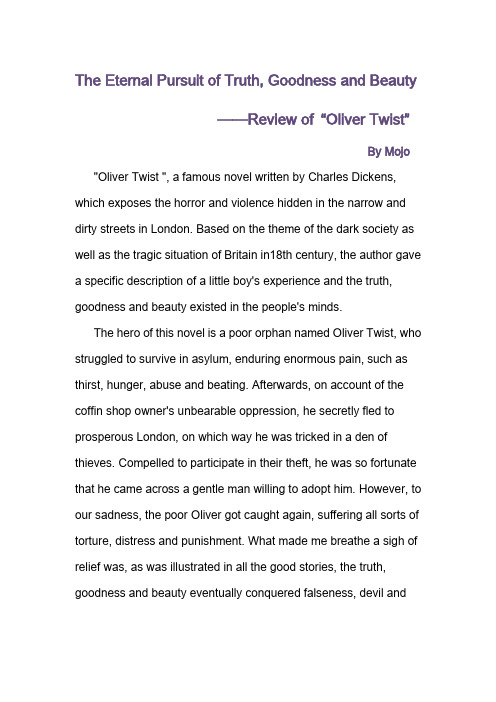
The Eternal Pursuit of Truth, Goodness and Beauty——Review of “Oliver Twist”By Mojo "Oliver Twist ", a famous novel written by Charles Dickens, which exposes the horror and violence hidden in the narrow and dirty streets in London. Based on the theme of the dark society as well as the tragic situation of Britain in18th century, the author gave a specific description of a little boy's experience and the truth, goodness and beauty existed in the people's minds.The hero of this novel is a poor orphan named Oliver Twist, who struggled to survive in asylum, enduring enormous pain, such as thirst, hunger, abuse and beating. Afterwards, on account of the coffin shop owner's unbearable oppression, he secretly fled to prosperous London, on which way he was tricked in a den of thieves. Compelled to participate in their theft, he was so fortunate that he came across a gentle man willing to adopt him. However, to our sadness, the poor Oliver got caught again, suffering all sorts of torture, distress and punishment. What made me breathe a sigh of relief was, as was illustrated in all the good stories, the truth, goodness and beauty eventually conquered falseness, devil andugliness, thus Oliver lived a blissful and carefree life in the end, with the selfless help of those who own a kind heart.One of the plots that attracted me most is that after seven days'escape journey, hungry and tired, Oliver was brought into an embezzling group without consciousness. Nevertheless, realizing their behavior were guilty, he tried his utmost to run away, in spite of being cruelly tortured. To be frank, the scene calls forth my admiration spontaneously from the bottom of my heart. He is merely 10 years old, yet the adamancy, bravery and justice he owns are bound to be unparalleled. So righteous was him that he would rather lead a vagrant life than do something immoral.How can such a little boy who had already tolerated affliction remain original pure in both body and mind? As far as I am concerned, the reason is the eternal pursuit of truth, goodness and beauty. Maybe it is the most essential substance implied in the novel by Dickens that virtue could conquer every difficulty and obstacle. Honestly, there is no absolute goodness or wickedness. However, this novel reflects human beings' eternal pursuit of truth, goodness and beauty. Just as the old proverb goes, vice punished and virtue rewarded. Although I don't think truth, goodness and beauty are omnipotent, yet I do believe that those who are kind-hearted live more happily than those who areevil-minded.Regardless of our living environment, it is necessary for us to maintain a holy heart, filled with kindness and humanity. In this way, not only do we have a beautiful, harmonious society, but also the joy and happiness will be with us forever.From my point of view, the whole novel abounds with dramatic cliffhanger, which not only arouses readers's pity for Oliver's miserable fate and indignation to the bourgeoisie as well as the evildoer, but also makes audience deeply touched by thosekind-hearted people. As Charles Dickens once said, love makes the world go around. These immortal words have inspired and will keep on inspiring us to chant the melody of truth, goodness and beauty, whose true meaning is love, the selfless love for everyone. Don't hesitate to pursue the truth, goodness and beauty, let us enjoy wonderful life and treat other people lovingly.New words: profound palm agistrate reluctantly sympathetically magnanimously philosopher rampacious apparition graciousGood sentences:1. As he spoke, he pointed hastily to the picture above Oliver’s head; and then to the boy’s face. There was its living copy. The eyes, the head, the mouth; every feature was the same. The expression was, for an instant, so precisely alike, that the minutest line seemed copied with startling accuracy.2. When the boy is worth a hundred pounds to me, am I to lose what chance threw me in the way of getting safely, through the whims of a drunken gang that I could whistle away the lives of! And me bound, too, to a born devil, that only wants the will and has the power.3. “But even if he has been wicked,”pursed Rose, “think how young he is, think that he may never have known a mother’s love, or the comfort of a home; and that ill-usage and blows, or the want of bread, may have driven him to herd with men who have forced him to guilt. Aunt, dear aunt, for mercy’s sake, think of this, before you let them drag this sick child to a prison, which in any case must be the grave of all his chances of amendment”.4. If I had been less- less fortunate, the world would call it; if some obscure and peaceful life had been my destiny; if I had been poor, sick, helpless; would you have turned from me then? Or has myprobable advancement to riches and honour, given this scruple birth?5. …raising herself with difficulty, on her knees, drew from her bosom a white handkerchief –Rose Maylie’s own, and holding it up, in her folded hands, as high towards heaven as her feeble strength would allow, breathed one prayer for mercy to her maker.。
The Book Review of Oliver Twist
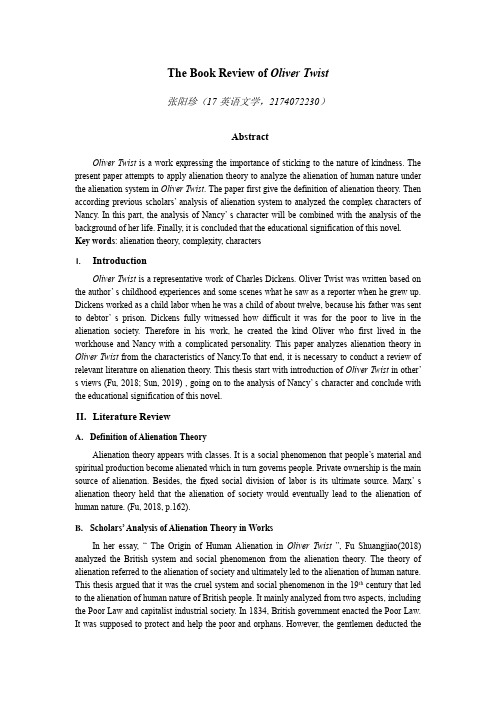
The Book Review of Oliver Twist张阳珍(17英语文学,2174072230)AbstractOliver Twist is a work expressing the importance of sticking to the nature of kindness. The present paper attempts to apply alienation theory to analyze the alienation of human nature under the alienation system in Oliver Twist. The paper first give the definition of alienation theory. Then according previous scholars’ analysis of alienation system to analyzed the complex characters of Nancy. In this part, the analysis of Nancy’ s character will be combined with the analysis of the background of her life. Finally, it is concluded that the educational signification of this novel.Key words: alienation theory, complexity, charactersI.IntroductionOliver Twist is a representative work of Charles Dickens. Oliver Twist was written based on the author’ s childhood experiences and some scenes what he saw as a reporter when he grew up. Dickens worked as a child labor when he was a child of about twelve, because his father was sent to debtor’ s prison. Dickens fully witnessed how difficult it was for the poor to live in the alienation society. Therefore in his work, he created the kind Oliver who first lived in the workhouse and Nancy with a complicated personality. This paper analyzes alienation theory in Oliver Twist from the characteristics of Nancy.To that end, it is necessary to conduct a review of relevant literature on alienation theory. This thesis start with introduction of Oliver Twist in other’ s views (Fu, 2018; Sun, 2019) , going on to the analysis of Nancy’ s character and conclude with the educational signification of this novel.II.Literature ReviewA.Definition of Alienation TheoryAlienation theory appears with classes. It is a social phenomenon that people’s material and spiritual production become alienated which in turn governs people. Private ownership is the main source of alienation. Besides, the fixed social division of labor is its ultimate source. Marx’ s alienation theory held that the alienation of society would eventually lead to the alienation of human nature. (Fu, 2018, p.162).B.Scholars’ Analysis of Alienation Theory in WorksIn her essay, “ The Origin of Human Alienation in Oliver Twist ”, Fu Shuangjiao(2018) analyzed the British system and social phenomenon from the alienation theory. The theory of alienation referred to the alienation of society and ultimately led to the alienation of human nature. This thesis argued that it was the cruel system and social phenomenon in the 19th century that led to the alienation of human nature of British people. It mainly analyzed from two aspects, including the Poor Law and capitalist industrial society. In 1834, British government enacted the Poor Law. It was supposed to protect and help the poor and orphans. However, the gentlemen deducted thefood of orphans and the poor in order to satisfy their own greed. The poor gradually became victims of the bourgeoisie seeking benefits. From the second perspective, Oliver Twist was written during the industrial revolution in the mid 19th century. It was the stage of capitalism development. During this period, people were indifferent and lured by money. People in that period of time always paid more attention to money instead of family. Eventually, she explained the alienation theory through the behavior that Oliver’ s brother murdering Oliver in order to inherit property.In her essay, “ The Realistic Social Interpretation of Oliver Twist ”, Sun Tingting(2019) analyzed the reality of Oliver Twist from three aspects, including children, inferior people and judicial authorities. Around the 19th century, romanticism and realism coexisted in the European literary system, while realism is more impressive than romanticism. In the first part of her thesis, it mainly described orphan’s living surroundings taking Oliver as an example. At the beginning of Oliver Twist, Oliver’ s mother was died when he was born. Besides, he was a bastard with no one taking care of him.When he lived in the workhouse, he was always deprived of food and occasionally whipped. From the perspective of the inferior people, the thesis analyzed three kinds of people. One was Fagin who instructed children to steal. The other were some children who was orphans without adults guiding them correctly. The last one was Nancy who could keep her kindness in the most difficult living environment although she may made a mistake. From the perspective of judicial authorities, Dickens criticized the bias in the judgement of the British judiciary. The thesis analyzed the phenomenon of alienation of human nature under the alienated social system.III.Writing BackgroundA.Personal Experience BackgroundOliver Twist was written by Charles Dickens. He was rated as the most popular English novelist of the nineteenth century. Oliver Twist was written based on the author’s childhood experiences and some scenes what he saw as a reporter when he grew up. When Charles Dickens was a boy of about twelve, his father was sent to debtor’s prison because of his inability to service debts. It led to the author’s unhappy childhood.Young Dickens came to know not only hunger and privation but also the evils of child labor when he had to go to work in a factory at twelve years old.“So Charles Dickens was suspended by circumstance and sensibility between grown-up realities and a child’s fantasies, between security and the fairy-tale fear of abandonment that we find throughout his work and, surely, in Oliver Twist” (Busch,2005). In addition, his work experience also influenced him a lot. When he was in his twenties. Dickens became a reporter and always wrote about slum neighborhoods. He used his journalist experience to write a successful fiction with many grim scenes.B.Historical BackgroundOliver Twist was a realistic novel published in 1838. It was published in the Victorian era, which was the most brilliant period in British. Although after the Industrial Revolution, the economy developed rapidly. It also led to the rapid development of capitalism. While the country was prospering, there was an unrecognized darkness. There were many poor, unfortunate and oppressed people in this country. Class conflicts were obvious, which eventually led to the declineof national strength. To solve this problem, the Poor Laws was enacted in this country at the end of the 19th century. It allowed the poor to rely on public assistance while requiring them to work. They are forced to endure unimaginable suffering. It was during this period Oliver Twist was published.IV.Analysis of Nancy’ s PersonalitiesNancy had a complicated personalities. On the one hand, she participated in kidnapping Oliver as a member of thieves. On the other hand, she helped Oliver ran away from Fagin at the expense of her own life which made Oliver lived a happy life at the end. It was the people with kind and cowardly complex character. Her miserable life determined her character was complex. Besides, her character determined her miserable ending.A.KindnessAfter Nancy knew Oliver’ s tragic experience, she felt very sympathetic to him. When she saw young Oliver being forced to steal, she remembered her painful childhood experience. There was a quarrel between Nancy and Fagin. In their conversation, it was mentioned that Nancy was forced to steal when she was about five years old. Nancy hoped that Oliver cannot be treated like her, however she was failed to prevent Fagin from hurting Oliver. She had tried her best to protect Oliver from being beaten. She rushed to Fagin to prevent Fagin beat Oliver with a stick. In order to express her hatred for Fagin and the gang of thieves, she shouted at Fagin that she was forced to become a thief when she was young and she had worked for gang of thieves for twelve years. When she saw Oliver being beaten, she vented her painful emotions for many years.When Fagin let the dog bite Oliver, Nancy kept begging Fagin to prevent it. “ “ Keep back the dog, Bill! ” cried Nancy, springing before the door, and closing it, as the Jew and his two pupils darted out in pursuit; “ Keep back the dog; he’ll tear the boy to pieces.” It was obvious that Nancy was worried about Oliver. It could be seen from these situations that Nancy was a kind person. However Nancy’ s kindness was not pure. She was not a completely kind person like Oliver. There was also evil part in her character. When Fagin asked someone to find out some information about Oliver who was in prison, he was refused. However, Nancy agreed to help him. In order to find out the news, she pretended Oliver’ s sister. Besides, she followed Sikes’ s request bringing Oliver back to the thieve’ s den with other people. It made Oliver unable to live a normal life. According to the Alienation Theory, it can be concluded that this kind of character was caused by the alienated system in Britain.B.Loyal loveIn Oliver Twist, Nancy is a people who attaches great importance to love. She is very loyal to her lover Sikes. In her mind, love is more important than her life and future. Although Sikes often beat her and even tortured to her with some words, Nancy still loved Sikes. Sikes was a indifferent person who didn’t love Nancy. He just treated Nancy as a tool to vent his emotions. Although Nancy understand it, she still couldn’t leave Sikes. In the end, Nancy was forced to betrayed Sikes in order to save Oliver. She still hoped Sikes would let her go. However in the end Nancy was mercilessly killed by Sikes.V.ConclusionsIn Oliver Twist, Dickens represented alienation theory through various phenomenon of human’s indifference after the development of bourgeoisie. He showed that it was difficult for the poor taking Nancy as a example to maintain kindness firmly in the difficult living environment. Besides, he demonstrated the hardships of their life. It exposed the capitalists’ selfishness and the supremacy of money.References[1]Dickens, Charles. Oliver Twist. Signet Classics, 2005[2]Fu Shuangjiao. The Origin of Human Alienation in Oliver Twist. Overseas English, 17(2018):162-181.[3]Busch, Frederick. Introduction copyright. Signet Classics, 2005[4]孙婷婷. (2019). 狄更斯《雾都孤儿》中的现实色彩解读. 山东农业工程学院学报。
Oliver Twist读书笔记
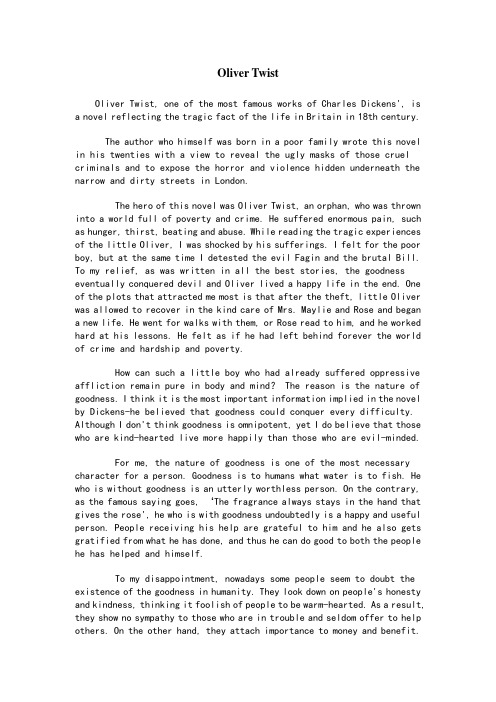
Oliver TwistOliver Twist, one of the most famous works of Charles Dickens', is a novel reflecting the tragic fact of the life in Britain in 18th century.The author who himself was born in a poor family wrote this novel in his twenties with a view to reveal the ugly masks of those cruel criminals and to expose the horror and violence hidden underneath the narrow and dirty streets in London.The hero of this novel was Oliver Twist, an orphan, who was thrown into a world full of poverty and crime. He suffered enormous pain, such as hunger, thirst, beating and abuse. While reading the tragic experiences of the little Oliver, I was shocked by his sufferings. I felt for the poor boy, but at the same time I detested the evil Fagin and the brutal Bill. To my relief, as was written in all the best stories, the goodness eventually conquered devil and Oliver lived a happy life in the end. One of the plots that attracted me most is that after the theft, little Oliver was allowed to recover in the kind care of Mrs. Maylie and Rose and began a new life. He went for walks with them, or Rose read to him, and he worked hard at his lessons. He felt as if he had left behind forever the world of crime and hardship and poverty.How can such a little boy who had already suffered oppressive affliction remain pure in body and mind? The reason is the nature of goodness. I think it is the most important information implied in the novel by Dickens-he believed that goodness could conquer every difficulty. Although I don't think goodness is omnipotent, yet I do believe that those who are kind-hearted live more happily than those who are evil-minded.For me, the nature of goodness is one of the most necessary character for a person. Goodness is to humans what water is to fish. He who is without goodness is an utterly worthless person. On the contrary, as the famous saying goes, ‘The fragrance always stays in the hand that gives the rose', he who is with goodness undoubtedly is a happy and useful person. People receiving his help are grateful to him and he also gets gratified from what he has done, and thus he can do good to both the people he has helped and himself.To my disappointment, nowadays some people seem to doubt the existence of the goodness in humanity. They look down on people's honesty and kindness, thinking it foolish of people to be warm-hearted. As a result, they show no sympathy to those who are in trouble and seldom offer to help others. On the other hand, they attach importance to money and benefit.In their opinion, money is the only real object while emotions and morality are nihility. If they cannot get profit from showing their ‘kindness', they draw back when others are faced with trouble and even hit a man when he is down. They are one of the sorts that I really detest.Francis Bacon said in his essay, ‘Goodness, of all virtues and dignities of the mind, is the greatest, being the character of the Deity, and without it, man is a busy, mischievous, wretched thing, no better than a kind of vermin.'That is to say a person without goodness is destined to lose everything. Therefore, I, a kind person, want to tell those 'vermin-to-be' to learn from the kind Oliver and regain the nature of goodness.。
oliver twist主要内容
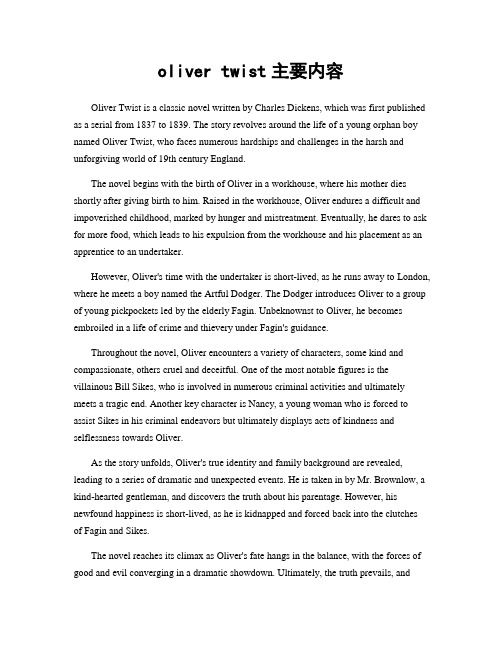
oliver twist主要内容Oliver Twist is a classic novel written by Charles Dickens, which was first published as a serial from 1837 to 1839. The story revolves around the life of a young orphan boy named Oliver Twist, who faces numerous hardships and challenges in the harsh and unforgiving world of 19th century England.The novel begins with the birth of Oliver in a workhouse, where his mother dies shortly after giving birth to him. Raised in the workhouse, Oliver endures a difficult and impoverished childhood, marked by hunger and mistreatment. Eventually, he dares to ask for more food, which leads to his expulsion from the workhouse and his placement as an apprentice to an undertaker.However, Oliver's time with the undertaker is short-lived, as he runs away to London, where he meets a boy named the Artful Dodger. The Dodger introduces Oliver to a group of young pickpockets led by the elderly Fagin. Unbeknownst to Oliver, he becomes embroiled in a life of crime and thievery under Fagin's guidance.Throughout the novel, Oliver encounters a variety of characters, some kind and compassionate, others cruel and deceitful. One of the most notable figures is the villainous Bill Sikes, who is involved in numerous criminal activities and ultimately meets a tragic end. Another key character is Nancy, a young woman who is forced to assist Sikes in his criminal endeavors but ultimately displays acts of kindness and selflessness towards Oliver.As the story unfolds, Oliver's true identity and family background are revealed, leading to a series of dramatic and unexpected events. He is taken in by Mr. Brownlow, a kind-hearted gentleman, and discovers the truth about his parentage. However, his newfound happiness is short-lived, as he is kidnapped and forced back into the clutchesof Fagin and Sikes.The novel reaches its climax as Oliver's fate hangs in the balance, with the forces of good and evil converging in a dramatic showdown. Ultimately, the truth prevails, andOliver's virtue and innocence are recognized, leading to a resolution that brings justice and closure to the characters' fates.In conclusion, Oliver Twist is a timeless tale that delves into the themes of poverty, morality, and the struggle between good and evil. Through the trials and tribulations of its protagonist, the novel offers a poignant portrayal of the human spirit and the enduring power of hope. Charles Dickens' masterful storytelling and vivid characters continue to captivate readers, making Oliver Twist a literary classic that remains relevant and compelling to this day.。
oliver twis读后感
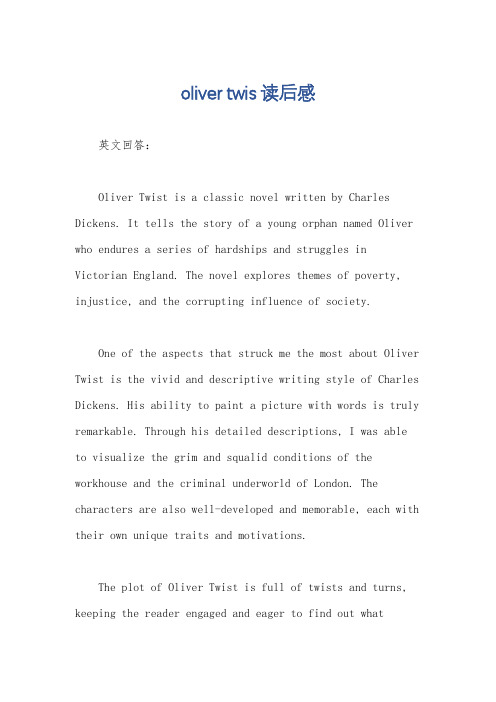
oliver twis读后感英文回答:Oliver Twist is a classic novel written by Charles Dickens. It tells the story of a young orphan named Oliver who endures a series of hardships and struggles inVictorian England. The novel explores themes of poverty, injustice, and the corrupting influence of society.One of the aspects that struck me the most about Oliver Twist is the vivid and descriptive writing style of Charles Dickens. His ability to paint a picture with words is truly remarkable. Through his detailed descriptions, I was able to visualize the grim and squalid conditions of the workhouse and the criminal underworld of London. The characters are also well-developed and memorable, each with their own unique traits and motivations.The plot of Oliver Twist is full of twists and turns, keeping the reader engaged and eager to find out whathappens next. From Oliver's escape from the workhouse to his encounters with the notorious Fagin and the kind-hearted Mr. Brownlow, the story is filled with suspense and excitement. The novel also exposes the harsh realities of the time, such as child labor, poverty, and theexploitation of the poor.Another aspect that stood out to me is the social commentary embedded within the story. Dickens uses Oliver's journey as a way to criticize the social injustices and inequalities of his time. He highlights the stark contrast between the wealthy and the impoverished, and the corrupting influence of greed and power. The novel serves as a powerful reminder of the importance of compassion and empathy towards those less fortunate.Overall, Oliver Twist is a thought-provoking and emotionally charged novel that delves into the darker aspects of society. It is a timeless classic that continues to resonate with readers today.中文回答:《雾都孤儿》是查尔斯·狄更斯创作的一部经典小说。
OliverTwist狄更斯《雾都孤儿》大意及读后感
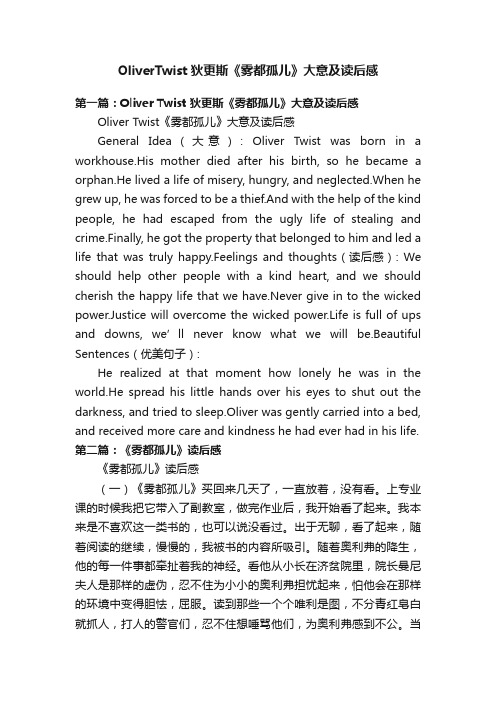
OliverTwist狄更斯《雾都孤儿》大意及读后感第一篇:Oliver Twist 狄更斯《雾都孤儿》大意及读后感Oliver Twist《雾都孤儿》大意及读后感General Idea(大意): Oliver Twist was born in a workhouse.His mother died after his birth, so he became a orphan.He lived a life of misery, hungry, and neglected.When he grew up, he was forced to be a thief.And with the help of the kind people, he had escaped from the ugly life of stealing and crime.Finally, he got the property that belonged to him and led a life that was truly happy.Feelings and thoughts(读后感): We should help other people with a kind heart, and we should cherish the happy life that we have.Never give in to the wicked power.Justice will overcome the wicked power.Life is full of ups and downs, we’ll never know what we will be.Beautiful Sentences(优美句子):He realized at that moment how lonely he was in the world.He spread his little hands over his eyes to shut out the darkness, and tried to sleep.Oliver was gently carried into a bed, and received more care and kindness he had ever had in his life. 第二篇:《雾都孤儿》读后感《雾都孤儿》读后感(一)《雾都孤儿》买回来几天了,一直放着,没有看。
雾都孤儿主题英语作文
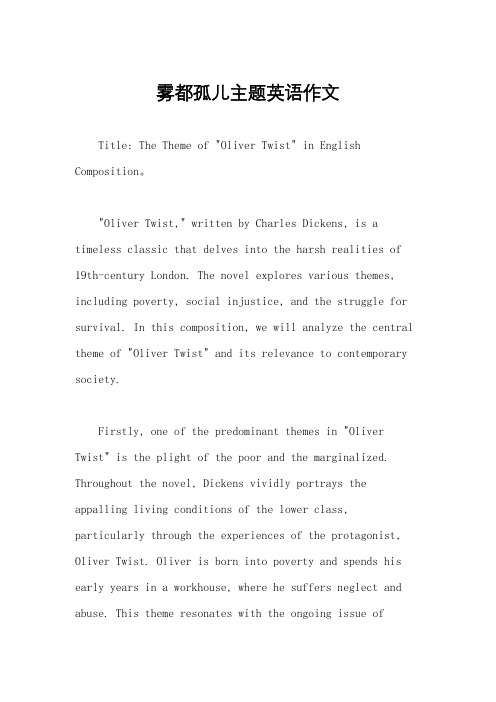
雾都孤儿主题英语作文Title: The Theme of "Oliver Twist" in English Composition。
"Oliver Twist," written by Charles Dickens, is a timeless classic that delves into the harsh realities of 19th-century London. The novel explores various themes, including poverty, social injustice, and the struggle for survival. In this composition, we will analyze the central theme of "Oliver Twist" and its relevance to contemporary society.Firstly, one of the predominant themes in "Oliver Twist" is the plight of the poor and the marginalized. Throughout the novel, Dickens vividly portrays the appalling living conditions of the lower class,particularly through the experiences of the protagonist, Oliver Twist. Oliver is born into poverty and spends his early years in a workhouse, where he suffers neglect and abuse. This theme resonates with the ongoing issue ofpoverty and inequality in modern society. Despite advancements in social welfare, many individuals and families still struggle to meet their basic needs, highlighting the enduring relevance of Dickens' portrayal of poverty.Moreover, "Oliver Twist" also explores the theme of social injustice and the abuse of power. The novel exposes the corrupt practices of institutions such as the workhouse and the criminal underworld, where individuals exploit the vulnerable for personal gain. Characters like Mr. Bumble, the workhouse master, and Fagin, the leader of a gang of thieves, represent the oppressive forces that perpetuate inequality and suffering. This theme prompts readers to reflect on the pervasive nature of injustice in society and the importance of challenging systems of oppression.Additionally, Dickens highlights the theme of redemption and the inherent goodness of human nature. Despite facing numerous hardships, Oliver retains his innocence and compassion towards others. His unwavering moral integrity stands in contrast to the cynicism andselfishness of many other characters in the novel. Through Oliver's journey, Dickens suggests that kindness and virtue can triumph over adversity, offering hope in the face of despair. This theme serves as a powerful reminder of the resilience of the human spirit and the potential for positive change in society.Furthermore, "Oliver Twist" explores the theme of identity and belonging. Oliver's search for his true identity and place in the world drives much of the narrative, as he grapples with questions of heritage and self-discovery. His quest for belonging reflects the universal human desire for connection and acceptance. This theme resonates with individuals who may feel marginalized or alienated in contemporary society, emphasizing the importance of empathy and understanding towards others' struggles.In conclusion, "Oliver Twist" remains a relevant and thought-provoking work that continues to resonate with readers today. Its exploration of themes such as poverty, social injustice, redemption, and identity offers valuableinsights into the human condition and challenges readers to confront issues of inequality and injustice in their own communities. As we navigate the complexities of the modern world, the enduring themes of "Oliver Twist" serve as a poignant reminder of the need for compassion, solidarity, and social change.。
The Realism in the Oliver Twist

The Realism in the Oliver TwistOliver Twist is one of the most famous works of Charles Dickens, who was a prominent novelist. Oliver Twist reflects the real and terrible life of London underworld. It has given expression to the benevolence and despotic that lies in the novel, and exposes the darkest, filthiest phenomenon of the society. According to the background, we can see the critical realism in this novel.The author who himself was born in a poor family wrote this novel in his twenties with a view to reveal the ugly masks of those cruel criminals and to expose the horror and violence hidden underneath the narrow and dirty streets in London.The hero of this novel was Oliver Twist, an orphan, who was thrown into a world full of poverty and crime. He suffered enormous pain, such as hunger, thirst, beating and abuse. All these dark scenes can reveal the corruption of the society.Always hungry, he asked one day for a second serving of porridge, the result is he within an inch of being hang, the scandalized authorities put him in solitary confinement and posted a bill offering five pounds to any master who would ask take him off the parish. How cruel are they! He is only nine! This is only the smallest part of the novel that criticizes the ruthless, merciless, dark and realistic of the upper class people and the society. Even though, Oliver always keeps a pure, kind and integrity heart, it can reflect the contrast of those wicked people who always want to persecute Oliver.All of Dickens’ critical realism intention is perfectly shows in the novel.It’s better to read it carefully.。
每月阅读Oliver Twist一部分英文版读后感

My thoughts of Oliver TwistThis month I begin to read Oliver Twist and I have read sixteen chapters already. Before I read it, I watched its movie’s version. I’m deeply appealed by the plot of this story so I decided to read its original. The first sixteen chapters describe Oliver’s experience from his birth to the return to the resort of thieves.People at that time always looked down upon and abused the poor children. One of which impress me a lot is that when Oliver was nine years old, he was sent back to the workhouse where he was born. He had to pick up the oakum from those old ropes which were used in the queen’s ships. It sounds so ridiculous that the adult in the story thought that it’s a useful trade. Those children in the workhouse were very weak and the board was very fat. The board treated the children badly but the outside world thought those children were well treated. And Mrs. Sowerberry, Oliver’s new mistress, only gave Oliver the leftover from the dog for his dinner. Those miserable scenes make me feel uneasy. Another impressive part is that Oliver fled to the London and became a member of a resort of thieves. The leader of them, an old man, taught them how to steal things and what the valuable things are. Everyday they practiced how to steal and Oliver thought they were funny. He didn’t know they were guilty. From the view of surface, the old man treated thechildren well but actually he only wanted to make use of them. This shows that somebody at that time were very immoral. Under the teaching of the old man, children became greedy and sly. This teach mode made more and more bad people. This part also describes the buildings of common people and the rich. It shows a great difference which can shock you.Through writing Oliver’s story, the author presents the scene of that time. People didn’t care poor children and made them work. It really wrecked poor children physically and mentally. Child labourer also appears nowadays. From here we see that the poor children still lack protection. Moreover the evil men always make use of ignorant children before and today. This is really one of the roots of social crime. It follow that people should care the poor children and give them right guide. That’s what I think of a part of this book and I will continue to read it.。
- 1、下载文档前请自行甄别文档内容的完整性,平台不提供额外的编辑、内容补充、找答案等附加服务。
- 2、"仅部分预览"的文档,不可在线预览部分如存在完整性等问题,可反馈申请退款(可完整预览的文档不适用该条件!)。
- 3、如文档侵犯您的权益,请联系客服反馈,我们会尽快为您处理(人工客服工作时间:9:00-18:30)。
A Study of Oliver Twist’s Major Themes and SymbolsIn Oliver Twist, Dickens mixes grim realism and merciless satire as a way to describe the effects of industrialism on 19th-century England and to criticize the harsh new Poor Laws. Oliver, an innocent child, is trapped in a world where his only options seem to be the workhouse, Fagin's gang, a prison, or an early grave. From this unpromisingindustrial/institutional setting, however, a fairy tale also emerges. In the midst of corruption and degradation, the essentially passive Oliver remains pure-hearted; he steers away from evil when those around him give in to it, and in proper fairy-tale fashion, he eventually receives his reward — leaving for a peaceful life in the country, surrounded by kind friends. On the way to this happy ending, Dickens explores the kind of life an orphan, outcast boy could expect to lead in 1830s London.Poverty and social classPoverty is a prominent concern in Oliver Twist. Throughout the novel, Dickens enlarges on this theme, describing slums so decrepit that whole rows of houses are on the point of ruin. In an early chapter, Oliver attends a pauper's funeral with Mr. Sowerberry and sees a whole family crowded together in one miserable room.This ubiquitous misery makes Oliver's few encounters with charity and love more poignant. Oliver owes his life several times over to kindness both large and small. The apparent plague of poverty that Dickens describes also conveyed to his middle-class readers how much of the London population was stricken with poverty and disease. Nonetheless, in Oliver Twist he delivers a somewhat mixed message about social caste and social injustice. Oliver's illegitimate workhouse origins place him at the nadir of society; as an orphan without friends, he is routinely despised. His "sturdy spirit" keeps him alive despite the torment he must endure. Most of his associates, however, deserve their place among society's dregs and seem very much at home in the depths. Noah Claypole, a charity boy like Oliver, is idle, stupid, and cowardly; Sikes is a thug; Fagin lives by corrupting children; and the Artful Dodger seems born for a life of crime. Many of the middle-class people Oliver encounters—Mrs. Sowerberry, Mr. Bumble, and the savagely hypocritical "gentlemen" of the workhouse board, for example—are, if anything, worse.Oliver, on the other hand, who has an air of refinement remarkable for a workhouse boy, proves to be of gentle birth. Although he has been abused and neglected all his life, he recoils, aghast, at the idea of victimizing anyone else. This apparently hereditary gentlemanliness makes Oliver Twist something of a changeling tale, not just an indictment of social injustice. Oliver, born for better things, struggles to survive in the savage world of the underclass before finally being rescued by his family and returned to his proper place—a commodious country house.In a recent film adaptation of the novel, Roman Polanski dispenses with the problem of Oliver's genteel origins by making him an anonymous orphan, like the rest of Fagin's gang.SymbolismDickens makes considerable use of symbolism. The many symbols Oliver faces are primarily good versus evil, with evil continually trying to corrupt and exploit good, but good winning out in the end. The "merry old gentleman" Fagin, for example, has satanic characteristics: he is a veteran corrupter of young boys who presides over his own corner of the criminal world; he makes his first appearance standing over a fire holding a toasting-fork; and he refuses to pray on the night before his execution. The London slums, too, have a suffocating, infernal aspect; the dark deeds and dark passions are concretely characterised by dim rooms and pitch-black nights, while the governing mood of terror and brutality may be identified with uncommonly cold weather. In contrast, the countryside where the Maylies take Oliver is a pastoral heaven. The novel is also shot through with a related motif, obesity, which calls attention to the stark injustice of Oliver's world. When the half-starved child dares to ask for more, the men who punish him are fat. A remarkable number of the novel's characters are overweight.Toward the end of the novel, the gaze of knowing eyes becomes a potent symbol. For years, Fagin avoids daylight, crowds, and open spaces, concealing himself most of the time in a dark lair. When his luck runs out at last, he squirms in the "living light" of too many eyes as he stands in the dock, awaiting sentence. Similarly, after Sikes kills Nancy, he flees into the countryside but is unable to escape the memory of her dead eyes. In addition, Charley Bates turns his back on crime when he sees the murderous cruelty of the man who has been held up to him as a model.CharactersIn the tradition of Restoration Comedy and Henry Fielding, Dickens fits his characters with appropriate names. Oliver himself, though "badged and ticketed" as a lowly orphan and named according to an alphabetical system, is, in fact, "all of a twist." Mr. Grimwig is so called because his seemingly "grim", pessimistic outlook is actually a protective cover for his kind, sentimental soul. Other character names mark their bearers as semi-monstrous caricatures. Mrs. Mann, who has charge of the infant Oliver, is not the most motherly of women; Mr. Bumble, despite his impressive sense of his own dignity, continually mangles the king's English he tries to use; and the Sowerberries are, of course, "sour berries", a reference to Mrs. Sowerberry's perpetual scowl, to Mr. Sowerberry's profession as an undertaker, and to the poor provender Oliver receives from them. Rose Maylie’s name echoes her association wit h flowers and springtime, youth and beauty, while Toby Crackit’s is a reference to his chosen profession of housebreaking.Bill Sikes's dog, Bull's-eye, has "faults of temper in common with his owner" and is an emblem of his owner’s character. The dog’s viciousness represents Sikes’s animal-like brutality, while Sikes's self-destructiveness is evident in the dog's many scars. The dog, with its willingness to harm anyone on Sikes's whim, shows the mindless brutality of the master. Sikes himself senses that the dog is a reflection of himself and that is why he tries to drown the dog. He is really trying to run away from who he is. This is also illustrated when Sikes dies and the dog does immediately also. After Sikes murders Nancy, Bull’s-eye also comes to represent Sikes's guilt. The dog leaves bloody footprints on the floor of the room where the murder is committed. Not long after, Sikes becomes desperate to get rid of the dog, convincedthat the dog’s presence will give him away. Yet, just as Sikes cannot sh ake off his guilt, he cannot shake off Bull’s-eye, who arrives at the house of Sikes’s demise before Sikes himself does. Bull's-eye's name also conjures up the image of Nancy's eyes, which haunts Sikes until the bitter end and eventually causes him to hang himself accidentally.Dickens employs polarised sets of characters to explore various dual themes throughout the novel; Mr. Brownlow and Fagin, for example, personify "good vs. evil". Dickens also juxtaposes honest, law-abiding characters such as Oliver himself with those who, like the Artful Dodger, seem more comfortable on the wrong side of the law. Crime and punishment is another important pair of themes, as is sin and redemption: Dickens describes criminal acts ranging from picking pockets to murder, and the characters are punished severely in the end. Most obviously, he shows Bill Sikes hounded to death by a mob for his brutal acts, and sends Fagin to cower in the condemned cell, sentenced to death by due process. Neither character achieves redemption; Sikes dies trying to run away from his guilt, and on his last night alive, the terrified Fagin refuses to see a rabbi or to pray, instead asking Oliver to help him escape. Nancy, by contrast, redeems herself at the cost of her own life, and dies in a prayerful pose.Nancy is also one of the few characters in Oliver Twist to display much ambivalence. Although she is a full-fledged criminal, indoctrinated and trained by Fagin since childhood, she retains enough empathy to repent her role in Oliver's kidnapping, and to take steps to try to atone. As one of Fagin's victims, corrupted but not yet morally dead, she gives eloquent voice to the horrors of the old man's little criminal empire. She wants to save Oliver from a similar fate; at the same time, she recoils from the idea of turning traitor, especially to Bill Sikes, whom she loves. When he was later criticised for giving a "thieving, whoring slut of the streets" such an unaccountable reversal of character, Dickens ascribed her change of heart to "the last fair drop of water at the bottom of a dried-up, weed-choked well".。
